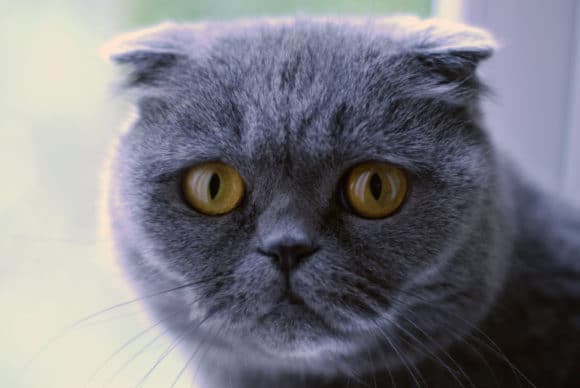Scottish fold Genetic Testing and Tests Available
Scottish fold genetic testing
I decided to approach this delicate subject. I think it is very important that you have as much information as possible about the Scottish Fold breed and the potential genetic diseases. The knowledge will allow you to make an informed decision.
The genetic testing in Scottish Fold
I will start with a basic introduction to genetic testing. It is a set of medical tests that determine changes in genes, chromosomes, and proteins. Genetic tests are done to establish if a cat suffers from a certain genetic condition. They can also show the cat’s predisposition to develop or pass on a genetic mutation. Of course, certain tests will give you in-depth information about the cat’s origin.
The Scottish Fold is a relatively new breed. This extremely cute cat comes from a white barn cat named Suzie, who lived in Scotland in 1961. Two of Susie’s kittens were born with folded ears. One of them was adopted and registered as a breed in the United Kingdom. This is how it all started.
The Scottish Fold can be both with folded or straight ears. Researches have proved that the folded ear is actually a mutation due to a single dominant gene. This typical mutation affects the entire bone structure in the organism.

What genetic diseases can a Scottish Fold have?
Osteochondrodysplasia in Scottish Folds
Scottish Fold Osteochondrodysplasia is a genetic disorder of bone and cartilage. This condition is due to the dominant gene mutation mentioned above. It is so sad to realize that the unique looking ears represent in fact a serious health condition.
This disorder of bone and cartilage causes severe and painful arthritis. Besides that, deformities can appear in the body: short limbs, inflexible and thick tail.
Scottish that has folded ears develop for sure osteochondrodysplasia. There is a difference though between homozygous and heterozygous for the gene. The first ones will show early signs of disease, with an aggressive development. For the latter, the disease appears later and has slower progress.

A cat with osteochondrodysplasia walks with difficulty, avoids jumping or making any move that can be painful. The pain can be eased with ongoing medication, at the vet’s recommendation. Unfortunately, the disease is incurable, so the treatment can only ease the pain. The presence of the disease can be determined through RX and CT, but also through genetic tests.
This terrible condition affects the cat’s quality of life. That is why the breed was excluded by the Governing Council of the Cat Fancy as a recognized breed in the UK (the country of origin), and later by the Fédération Internationale Féline.
It is difficult to breed correctly the Scottish Fold. According to the standards, a straight-eared Scottish is allowed to be outcrossed to either an American Shorthair or a British Shorthair. This is done to avoid the spreading of the mutated genes that can lead to genetic health problems.
Breeders are also recommended to run genetic tests on their cats before breeding. This is the best way to ensure that such a terrible defect is not passed on to generations.
Polycystic Kidney Disease in Scottish Folds
The Scottish Fold is also predisposed to polycystic kidney disease. This is another inherited disease. It is more common in Scottish Fold, Persian breeds, British Shorthair, etc.
Affected kidneys are full of fluid cysts. The cysts are present from birth, but they are very small in size. In time they grow and multiply until they replace the healthy tissue. In the end, the kidneys cannot function anymore and the cats will go into kidney failure.
This condition is inherited as one abnormal gene from the parent. If the cat has one copy of the abnormal gene, then it is enough to suffer from this condition.
The presence of PKD cannot be determined through an ultrasound at a very early age when the cysts are still developing. Therefore it is recommended to genetically test at any age. Breeders should stop breeding any cat that presents this condition. Only responsible breeding can improve the welfare of animals.
The disease is not curable and its progress is irreversible. Of course, treatment is necessary when symptoms occur.
Cardiomyopathy in Scottish Folds
The Scottish Fold can be affected by the heart muscle disease, like many other cat breeds. This serious condition of the heart can be dilated, restrictive or hypertrophic.
The treatment must be personalized, depending on the cat’s condition and symptoms. There aren’t any genetic tests available yet. But researches are being done, to determine mutations that cause the hypertrophic cardiomyopathy. I am sure that new tests will be available in the future for the benefit of the cats.
Are genetic tests necessary?
You decided to take (buy or adopt) a Scottish Fold kitten. Of course, you want to have a healthy and furry friend to share many happy years with.
To make sure you do that, please follow the basic recommendations:
- Visit the breeders and meet the parents of the kitten. It is important to see the conditions in which the adults are kept.
- Discuss with the breeders genetic testing and find out how many cats in the household have been tested. Are also spayed breed cats?
- Specifically, ask for genetic testing before deciding to take a kitten.
Conclusion
If more and more cat owners ask from the breeders to be responsible, we can make sure that they will eventually do it. This is the only way to avoid unnecessary suffering in animals, by stopping the spread of genetic conditions.
Do you have any Scottish Fold breeders that you would recommend?